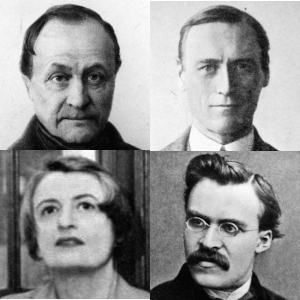- Altruism is truly selfless, and it’s good.
- Altruism is truly selfless, and it’s bad.
- Altruism is enlightened self-interest, which is good.
- Altruism is disguised/corrupted/decadent self-interest, which is bad.

To illustrate further, though at the risk of oversimplifying…
One exponent of option #1 would be Auguste Comte who thought that living for others was the foundation of true morality and of the best society.[1]
An exponent of option #2 would be Ayn Rand, who thought that altruism was indeed a doctrine of selflessness, but that this was the antithesis of true morality, and a threat to people.[2]
An exponent of option #3 would be Pierre Cérésole, who felt that altruism is what results when you refine your self-interest successfully and rid it of its mistakes.[3]
An exponent of option #4 would be Nietzsche, who thought altruism was a corrupted and decadent form of selfishness, and that we would be better off if we could be more forthrightly self-interested.[4]
Knowing LessWrong, probably everyone who answers is going to choose some nuanced and galaxy-brained option #5 instead, but I thought I’d ask anyway.
- ^
Auguste Comte “General Theory of Religion” The Catechism of Positive Religion (also e.g. “Social Physics”)
- ^
Ayn Rand, The Virtue of Selfishness (also e.g. “Galt’s Speech” For the New Intellectual; “Faith and Force: The Destroyers of the Modern World” Philosophy: Who Needs It)
FWIW, in "Justice, Cherryl." @Zack_M_Davis suggests that Rand is really closer to the position I attribute to Nietzsche.
- ^
Pierre Cérésole For Peace and Truth
- ^
Friedrich Nietzsche Beyond Good and Evil, The Twilight of the Idols, etc.
I don't think any one option is precise enough that it's correct on its own, so I will have to say "5" as well.
Here's my take:
Everything has dose-dependent and context-dependent pros and cons.
I think you're expecting too much of the word "good". I don't think any "good" exists such that more of it is always better, so I think "good" is a region of space rather than a direction. If optimization is gradient descent, then the "good" direction might change with every step you take. But if optimization means "what metric should we optimize for?" then we don't know (we have yet to find a single metric which an AGI could maximize without destroying humanity. Heading too far in any direction seems dangerous). So I think many peoples intuition of the word "good" can prevent them from ever hitting a satisfactory answer (as they're actually searching for something which can be taken to infinity without anything bad happening as a result, and not even considering the context in question)